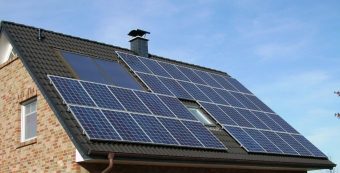
Clean energy delivered by solar and battery storage systems has emerged as one of the most popular smart home solutions on the market, with 44 per cent of people saying they would like at least one of the technologies installed in their home by the end of the decade.
More than a third of people said they would want smart lighting installed, while 20 per cent opted for a voice-controlled smart hub and 13 per cent want to install a charging point for an electric car, according to a new survey released today by energy supplier E.ON.
The survey, conducted by OnePoll in April on behalf of E.ON, questioned 2,000 UK homeowners and found almost 73 per cent have already adopted some kind of smart home technology, from digital photo albums to smart thermostats.
Respondents cited saving money and becoming more energy efficient as some of the key drivers for installing smart technologies.
“It’s really heartening that three quarters of households have already taken steps to make their homes smarter,” Gavin Stokes, head of commercial solutions at E.ON UK, said in a statement. “But with a quarter of people saying they’re yet to take steps to make their homes more solutions-savvy, there’s still much we can do to help people realise the benefits a smarter lifestyle can bring.”
Solar may have emerged as a clear technology favourite, but the survey also found a patchy level of understanding about how the technology works.
Almost a fifth of those surveyed believe solar panels only generate electricity when it is sunny, while one in 10 people think solar panels do not work in colder climates – both common myths about the technology that developers and installers have struggled to dispel.
The survey comes as solar-plus-storage solutions are beginning to make their way onto the mainstream market. Firms including E.ON, Moixa, LG Chem, Tesla, North Star Solar, and MEP Werke are all offering solar-plus-storage solutions to domestic energy customers, with studies suggesting half of all EU citizens could be generating their own energy by 2050.
Advocates of the technology maintain it can maximise financial returns and emissions savings from solar installations and also potentially allow households and businesses to sell grid balancing services to grid operators. Providers of solar-storage systems are also increasingly confident that as costs fall the technology offering can prove attractive to customers without recourse to subsidies.
In related news, E.ON this week announced new plans to drive the growth of clean energy across its businesses with the creation of its own procurement and marketing functions for the German, British and Swedish markets. The teams will focus on purchasing power and gas for customers and marketing the production from renewable sources, E.ON said.
Source: businessgreen.com

